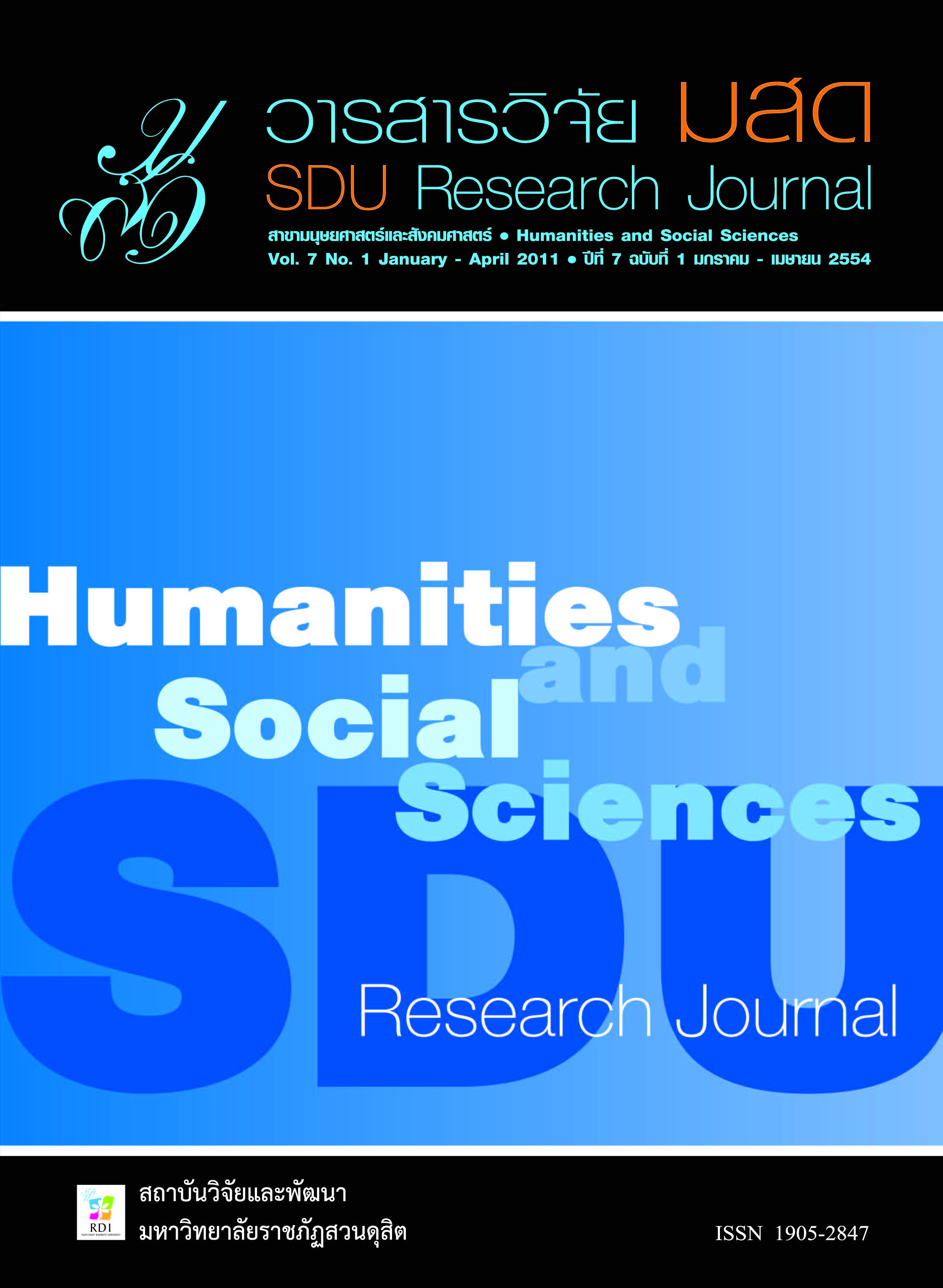กิจกรรมทางกาย พฤติกรรมการบริโภคอาหาร และความเสี่ยงต่อการเกิดโรคหัวใจ และหลอดเลือดในบุคลากรมหาวิทยาลัยราชภัฏสวนดุสิต
Keywords:
กิจกรรมทางกาย, พฤติกรรมการบริโภคอาหาร, ความเสี่ยงต่อการเกิดโรคหัวใจและหลอดเลือด, Physical activity, Dietary behaviors, Cardiovascular Risk, Rama-EGAT heart scoreAbstract
บทคัดย่อ
รายงานการศึกษานี้ เป็นผลการวิจัยเชิงสำรวจ เพื่อศึกษาการมีกิจกรรมทางกาย พฤติกรรมการบริโภคอาหาร และ ความเสี่ยงต่อการเกิดโรคหัวใจและหลอดเลือด กลุ่มตัวอย่าง ประกอบด้วยบุคลากรทุกประเภทของมหาวิทยาลัยราชภัฏสวนดุสิต ซึ่งยินดีให้ความร่วมมือในการวิจัย จำนวน 1,081 คน เครื่องมือที่ใช้ในการวิจัยประกอบด้วย 1) แบบสอบถามการมีกิจกรรมทางกายของ IPAQ (International Physical Activity Questionnaire) แบบ Short form 2) แบบวัดพฤติกรรมการบริโภคอาหารที่เสี่ยงต่อการเกิดโรคหัวใจและหลอดเลือด ที่คณะผู้วิจัยพัฒนาขึ้น และ 3) แบบประเมินความเสี่ยงต่อการเกิดโรคหลอดเลือดหัวใจสำหรับคนไทย (Rama-EGAT heart score) ซึ่งพัฒนาโดยคณะแพทยศาสตร์โรงพยาบาลรามาธิบดี
ผลการวิเคราะห์ข้อมูล พบว่ากลุ่มตัวอย่างมีกิจกรรมทางกายที่ออกแรงปานกลาง และออกแรงมาก โดยเฉลี่ยวันละประมาณ ครึ่งชั่วโมง ใช้เวลาในการเดินประมาณวันละ ชั่วโมงครึ่ง และ นั่ง ประมาณวันละ 5 ชั่วโมง ซึ่งจากการเทียบกับเกณฑ์มาตรฐานนานาชาติ พบว่า กลุ่มตัวอย่างร้อยละ 62.5 เป็นผู้ที่มีกิจกรรมทางกายในระดับปานกลาง และ ระดับมาก ซึ่งจะส่งผลดีต่อสุขภาพ ที่เหลือร้อยละ 37.5 มีกิจกรรมทางกายในระดับต่ำ โดยบุคลากรที่ทำงานด้านธุรการมีสัดส่วนของผู้ที่มีกิจกรรมทางกายในระดับต่ำมากที่สุด ในด้านพฤติกรรมการบริโภคอาหาร พบว่ากลุ่มตัวอย่างมีพฤติกรรมการบริโภคอาหารที่เสี่ยงต่อการเกิดโรคหัวใจและหลอดเลือดอยู่ในระดับ มาก (Mean 2.18, S.D 0.29) และ พบว่า กลุ่มตัวอย่างร้อยละ 2.8 เป็นผู้ที่มีความเสี่ยงสูงสุดคือคะแนนความเสี่ยงมากกว่า 14 ซึ่งหมายความว่าในคนกลุ่มนี้จะมีโอกาสเกิดโรคหลอดเลือดหัวใจขั้นรุนแรงในระยะเวลา 10 ปี ถึงร้อยละ 8-12 ผลการทดสอบความแปรปรวนทางเดียว พบว่า มีความแตกต่างอย่างมีนัยสำคัญทางสถิติที่ระดับ 0.05 ของค่าเฉลี่ยคะแนนความเสี่ยงต่อการเกิดโรคหัวใจและหลอดเลือดในบุคลากรที่ปฏิบัติงานลักษณะแตกต่างกัน โดยกลุ่มผู้บริหารมีความเสี่ยงสูงมากกว่ากลุ่มอื่นๆ
ผลการศึกษาสามารถบ่งชี้ผู้ที่มีความเสี่ยงสูงต่อการเกิดโรคหัวใจและหลอดเลือด และกลุ่มบุคลากรที่จำเป็นต้องเร่งรัดในการสร้างเสริมสุขภาพ และมีข้อเสนอแนะสำหรับการวิจัยครั้งต่อไป
คำสำคัญ : กิจกรรมทางกาย, พฤติกรรมการบริโภคอาหาร, ความเสี่ยงต่อการเกิดโรคหัวใจและหลอดเลือด
Abstract
This survey research was aimed to study the physical activities, dietary behaviors and cardiovascular risk among Rajabhat Suan Dusit University’s personnel. Data were collected voluntarily from the sample of 1,081 personnel during 19-21 March 2009 using three sets of measures namely:- 1) International Physical Activity Questionnaire (IPAQ)-Short form 2) Cardiovascular riskily dietary behaviors questionnaire developed by researchers and 3) A screening test for the early detection of coronary heart disease (CHD) in Thai people called “Rama-EGAT heart score”.
The results showed that on average participants had spent time on vigorous and moderate intensity activities for 30 min., walking 30 min. and sitting for five hrs. per day. Comparing to the international standard, 62.5 percent of participants had enough vigorous and moderate intensity activities, while the rest of 37.5 percent had low physical activity level, which whom administrative personnel were the majority among them. Their cardiovascular risky dietary behaviors were considered high (Mean 2.18, S.D 0.29). It was found that 2.8 percent of participants had cardiovascular risk score, measured by Rama-EGAT heart score, 14 or over which means that they had a 8-12 percent of having severe coronary heart diseases (myocardial infarction and coronary death) in the next ten years. The one-way ANOVA test showed that there were statistically significant differences at the 5% level of mean cardiovascular risk scores among personnel with different types of job, whom which executive personnel had highest risk scores.
The study could identify individuals who were high risk for severe coronary heart diseases and groups of personnel who need to participate in health promotion activities. Further studies were also recommended.
Keywords : Physical activity, Dietary behaviors, Cardiovascular Risk, Rama-EGAT heart score








